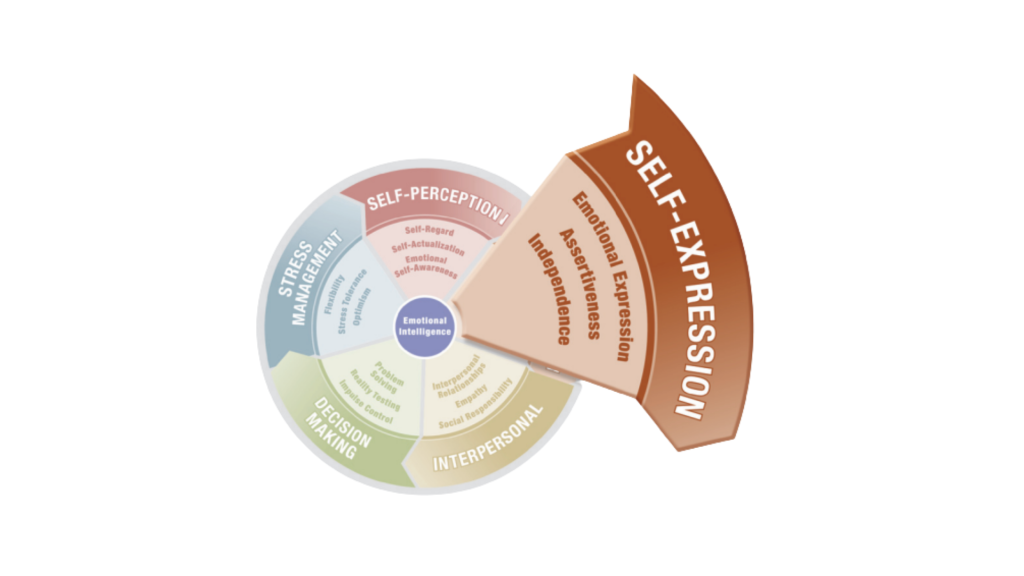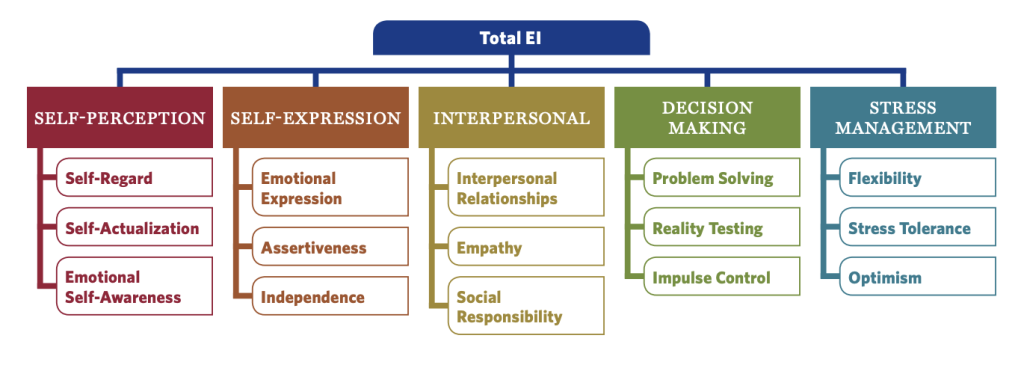In the realm of leadership, assertiveness is a crucial trait that can significantly influence the success of an individual in guiding and inspiring others. Often misunderstood for aggression or dominance, assertiveness is the ability to confidently express thoughts, opinions, and desires while respecting the perspectives of others. This blog explores the importance of assertiveness in leadership, the benefits it brings, and strategies to strike the right balance in its application.
Assertiveness in leadership falls into the ‘Self Expression’ scale of emotional intelligence designed by psychologist, Dr. Reuven Bar-on and relates to the ability to communicate with clarity, confidence, and conviction while maintaining a respectful and inclusive environment. Leaders strong in balancing their assertiveness may have the confidence to express ideas, set expectations, make decisions, and address conflicts in a manner that promotes collaboration, fosters trust, and drives positive outcomes.

While some leaders are skilled in the art of striking a balance when it comes to assertiveness, others find it a bit more challenging. The opposite of an assertive leader is a passive one. Passive leaders tend to avoid confrontation, shy away from making decisions, and prioritise maintaining harmony and the status quo over achieving goals. They often struggle with making themselves visible which can sometimes lead to a lack of direction and motivation within their teams.
I bet you’re now thinking of someone you’ve been led by who is either too assertive or too passive.
Assertiveness is about finding the balance to stand up for yourself and maintain the courage of your convections, while being empathic, respectful and, kind towards those your lead. And it pays off.
Here’s why empathic assertiveness will benefit you and your organisation:
Assertive leaders are skilled communicators who can convey expectations, interactions and feedback effectively. By expressing their thoughts clearly, they effectively minimise misunderstandings and create cohesive work environments.
Assertive leaders are able to make firm decisions, free from bias or emotion, weighing different perspectives and taking calculated risks to solve problems. They provide clear direction to their teams and inspire confidence through their decisive actions.
Those skilled in the art of assertiveness are able to resolve conflicts in a constructive manner. By openly discussing disagreements and seeking mutually beneficial solutions, these leaders foster a culture of collaboration and trust.
Assertive leaders empower their team members by encouraging them to express their ideas and opinions. They create an environment where everyone feels heard and valued, resulting in increased engagement and productivity.
Here’s why empathic assertiveness will benefit you and your organisation:
So, how can you hone your assertiveness?
It starts with listening. Effective leaders balance assertiveness with active listening. By genuinely listening to others’ perspectives, leaders demonstrate empathy and respect. When you’re listening to others, you’re naturally able to pick up on the impact of what you’re saying too.
Empathic leaders skilled in striking the assertiveness balance don’t impose directions or instructions on people, they involve others in the decision making process. By seeking input, considering diverse viewpoints, and facilitating open discussions, they promote a sense of ownership and collective responsibility.
This leads to constructive feedback. Leaders well versed in assertiveness can provide feedback in a supportive manner, focusing on specific behaviours and outcomes rather than attacking individuals. They aim to encourage growth and improvement while maintaining a supportive and respectful environment.

Assertive leaders are open to new ideas, feedback, and different approaches, adjusting their plans as necessary. Flexibility, again, helps builds trust and encourages collaboration.
Here are a few tips and tricks to help you build your leadership assertiveness in the workplace:
- Know your worth: Recognise your value and the contributions you bring to the table. Build confidence in your abilities, skills, and knowledge, which will serve as a foundation for assertiveness.
- Practice self-awareness: Reflect on your thoughts, feelings, and behaviours in different work situations. Identify areas where you tend to be passive or hesitant, and consciously work on changing those patterns.
- Improve your communication skills: Develop clear and concise communication techniques. Practice expressing your ideas, opinions, and expectations in a confident and respectful manner. Pay attention to your tone, body language, and the words you choose.
- Set boundaries: Clearly define your limits and communicate them to others. Be assertive in saying “no” when necessary and in asserting your needs. Respect your time and workload by learning to delegate and prioritise effectively.
- Active listening: Pay attention to what others are saying and make an effort to understand their perspectives. Actively listen without interrupting, and ask clarifying questions to demonstrate your engagement. This will help build rapport and create a collaborative environment.
- Seek feedback: Request feedback from colleagues or supervisors to gain insights into areas where you can improve your assertiveness. Embrace constructive criticism and work on incorporating the suggestions provided.
- Practice assertive body language: Stand tall, maintain eye contact, and use confident gestures. Projecting a positive and assertive physical presence can enhance your self-assurance and how others perceive you.
- Start small and build momentum: Begin by asserting yourself in smaller, less intimidating situations. Gradually challenge yourself to be more assertive in larger and more significant scenarios. Celebrate your successes along the way to boost your confidence.
- Manage conflict constructively: Address conflicts promptly and directly, focusing on the issues at hand rather than personal attacks. Use “I” statements to express your feelings and thoughts, and actively seek solutions that are mutually beneficial.
- Seek professional development: Consider attending workshops, seminars, or training programs on assertiveness, communication, and leadership skills. Investing in your personal growth and development will enhance your assertive abilities.
Ultimately, when striking the right balance between assertiveness and empathy, leaders inspire and motivate their teams while fostering collaboration and trust. By embracing assertiveness as a key leadership trait, individuals can unlock their full potential and guide their teams towards excellence.
If assertiveness is an area that you believe needs developing, why not learn more about our emotional intelligence coaching. We use the EQ-i 2.0, the world’s only scientifically validated tool for the measurement of emotional intelligence, to identify areas for development and work with our clients to help them achieve their goals.
